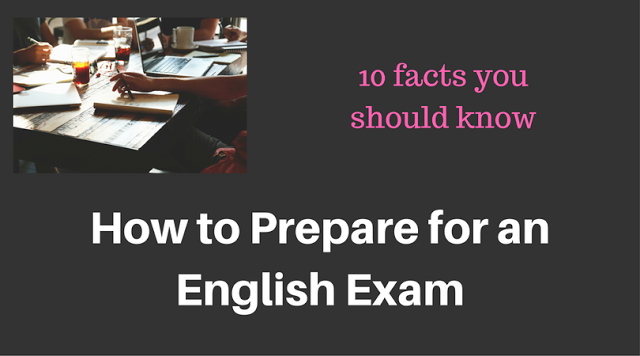10 Facts everyone should know about how to prepare for an English language exam
Language exams can be very difficult and stressful but unfortunately, for many students learning English, they are unavoidable. So you need to try to stay positive and do the best you can. So here are 10 tips for how to prepare for an English exam.
- Find out how the examiners will mark your work and what you will get points for. Do you need to use a variety of different grammar structures and tenses? Do you need good spelling? Do you need to be creative? Check what is important and do it! In most cases, the examiners need to see what you can do with the language – this often means it may be better to invent experiences and answers so that you can answer the question well. For example, if you’ve never had a pet but you are asked to talk about one – make it up!2. Check the rules for the exam carefully. Make sure you know how long you have for each section, how many times you will hear the listening, where you need to write your answers, what the word limits are for the writing, whether it’s better to guess answers (if you don’t lose marks for incorrect answers) or leave blanks (if you lose marks for incorrect answers). Make sure you don’t lose marks unnecessarily.
- Find old copies of the exam and take practice tests. Make sure you are familiar with the layout of the paper and the timing for each section.
- Try to attend an exam preparation course to learn specific exam techniques and get feedback from a teacher and learn what your strengths and weaknesses are and what you need to improve. Many English courses in England are designed specifically to help students to prepare for exams such as IELTS, FCE and CAE and can really help you to increase your chances of success. If you learn English in the UK, you should also find that your general fluency and confidence in the language also increases as you will be surrounded by the language all the time.
- When practicing timing, remember to leave a little bit of time at the end of the paper to check your work – to check your spelling, make sure you have answered every question, to make sure your writing makes sense and reads well and to make any last-minute corrections.
- When you are preparing for the exam, set yourself little targets to try and achieve each day or each week – for example, you might want to learn the spelling for 10 new words or you might want to take a listening practice test. Keep your targets realistic and celebrate your success when you achieve your targets. This will help you to stay motivated.
- If you have to write a certain number of words for a writing exam, check how many words per line you write on average. This way you can count lines instead of words in the exam. This will make counting your words much quicker.
- If you need to remember a lot for your exam, experiment with different memorization techniques. For example, if you want to remember vocabulary, try categorizing the words into groups according to the topic (e.g. travel/transports/work) or grammar (e.g. verbs + in or verbs + that + clause). If an individual word is really important for you, think about lots of different aspects of the word and draw a ‘spidergram’ to represent it. For example, you could write the definition, the pronunciation, a translation, related words in the same word family, collocations and an example sentence. When writing an example sentence you can also try to write a sentence that is personal and meaningful for you. This should help you to remember the word more effectively. Also, try to think about how you learn best: do you remember things if you look at them? If you hear them? If you write them down? Use this to your advantage to help you learn. For example, if you learn by looking at diagrams and drawings, try using highlighters, ‘mindmaps’ and color-coding to help you remember essay plans or key phrases.
- On the evening before the exam, try to rest. Don’t do any more preparation but try to relax or do some exercise and go to bed early so your mind is fresh the next day.
- On the day of the exam, arrive early so that you are not stressed and anxious before the exam starts. Try to stay calm and positive. Imagine yourself passing and doing well.

Put all of these tips into practice and you can’t go wrong.
Next step…
Are you interested in studying at LSI/IH Portsmouth?
Are you thinking of studying IELTS at LSI/IH Portsmouth?
Want to know more about us?


